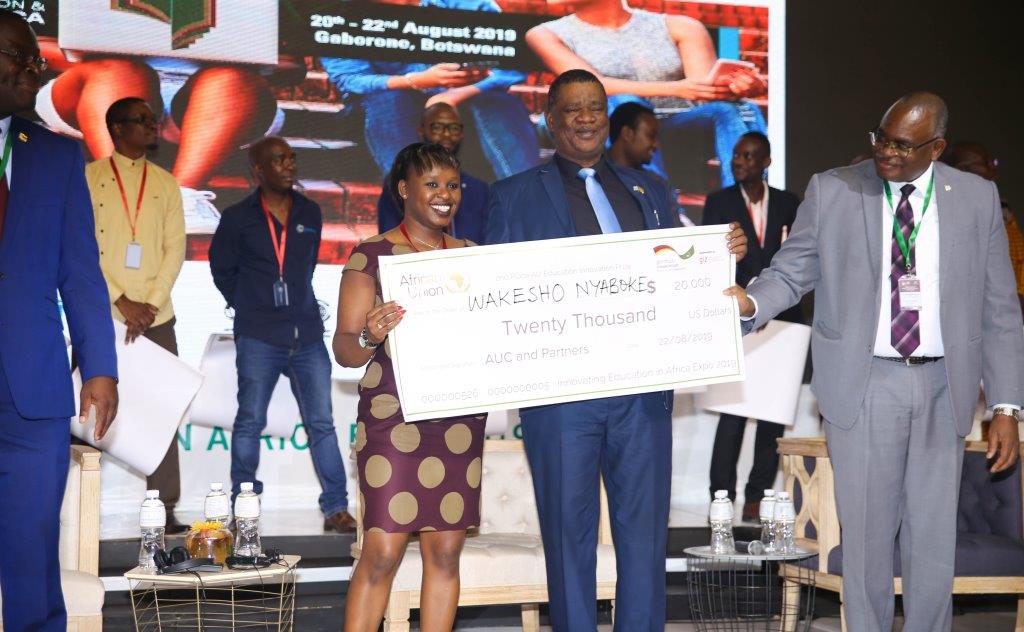The Second Edition of Innovating Education in Africa Expo, organised by the African Union Commission in collaboration with the Government of the Republic of Botswana and several key partner organisations was held from 20 - 22 August 2019 in Gaborone, Botswana. The opening session was presided over by His Honour, the Vice President of Botswana, H.E. Slumber Tsogwane. Welcome remarks were made by Honourable Bagalatia Arone, Minister of Basic Education of Botswana, and H.E. Prof. Sarah Anyang Agbor, Commissioner for Human Resources, Science and Technology of the African Union.
The Expo showcased ICT based innovative education solutions from across the continent for possible support including further development and replication. The event also provided a platform for education practitioners, policy makers, private sector, civil society and other stakeholders to exchange experiences, policies and challenges in enhancing education and learning outcomes through ICT based innovation education. The Expo raised the visibility of education innovators and innovative practices so that they can be supported, upscaled, replicated or further developed. The following Member States were represented by Ministers responsible for Education: Botswana, Ethiopia, Ghana, Rwanda, Tanzania, Uganda and Zimbabwe; while the following were represented by senior officials responsible for education: Angola, Benin, Burkina Faso, Burundi, Central African Republic, Chad, Comoros, Gambia, Guinea, Malawi, Mali, Nigeria, Senegal, and South Africa. About 450 participants from over forty countries attended the event.
The participants approved and adopted the following Communiqué.
Acknowledging:
- The support of the people and Government of the Republic of Botswana towards the successful hosting of the Innovating Education in Africa Expo.
- One of the objectives of Agenda 2063 is to reposition the continent as a strategic player in the global economy through improved education and application of Science, Technology and Innovation.
- The Chairperson of the African Union Commission launched the initiative “One Million by 2021” aimed at reaching 1 million young Africans with opportunities in the areas of Education, Employment, Entrepreneurship and Engagement.
- The importance of integrating ICT in curriculum at all levels for enhancing access and quality in education provision for meaningful contribution to entrepreneurship and employability of the youth in Africa.
- The theme for this year’s Expo, “Harnessing the Capacity of ICT to ensure Inclusion, Quality and Impact in Education and Training in Africa.” is aligned with Strategic Objective 3 of the Continental Education Strategy for Africa (CESA) which perfectly resonates with the quest of innovating Education.
- The labour market needs and demands for innovation, require significant knowledge and competences in Science, Technology, Engineering and Mathematics (STEM), and ICT based education.
- Africa’s sustained growth, competitiveness and economic transformation will require investments in new technologies and innovations that support education and skills training for empowerment, inventiveness, employability, entrepreneurship, responsible citizenship and harnessing Africa’s resource endowment.
- Innovation in Education is imperative to the implementation of the Continental Education Strategy for Africa (CESA), the Technical and Vocational Education and Training Strategy for Africa and achievement of both Agenda 2063 and the global Education Agenda 2030.
- The invaluable mandate and work of the African Union Commission to convene Member States and other key stakeholders for mutual learning, experience sharing, co-creation of solutions and consensus building.
Recommend the following:
- Harness the capacity of ICT innovations in education for effective teaching and learning process to ensure inclusion, quality and impact in education and training in Africa,
- Create facilities that promote girls and women’s education at all levels, focusing on STEM education and provide carrier guidance to create jobs for women in the applied sciences. Establish ICT-related vocational training centres for out-of-school girls;
- Increase integration of ICT in school curriculum to enhance digital skills of the youth to prepare them for the digital world and the 4th Industrial revolution towards generating employability of youths.
- Strengthen strategic partnerships based on common vision, comparative advantages, alignment of activities, mutual accountability and effective communication to support development of transformative policies and practices at national and continental levels.
- Strengthen innovative digital technologies for empowering teachers with the necessary digital literacy and ICT skills. Recognise the efforts made by teachers in promoting ICTs through awards, and strengthen alternative education provision including open, distance and e-learning.
- Improve ICT Infrastructure and internet connectivity to enhance access in primary schools and secondary schools for a Smart Education. Develop Student Technology Centres and Teachers’ Experience Centres.
- Ensure the use of ICT in education and training. Facilitate access to all including itinerant communities, people living in refugee situations, people living with various disabilities including silent disability.
- Develop good data management and information system for the collection, storage and analysis of data to increase the effectiveness of policy interventions. Use technologies in National Education Management Information Systems.
- Encourage African Education Innovators and support to give visibility to their innovations for further development and scale-up. Expand Network Platforms which enable networking, experience sharing and mutual support.
- Support substantive youth engagement within and across generations to ensure capturing of the youth voice and contribution towards harnessing the power and agency of ICT in education, training and development.
- Collaborate to review curricula at all levels to enhance skills acquisition at secondary school level, as well as links with industry for relevance at all levels including higher education and research. Declare digital literacy as a foundational skill alongside literacy and numeracy.
- As stewards of the education system, governments must own and lead the transformation of education ecosystems by creating an enabling environment for multiple stakeholders to contribute.
- Build on the successes of this Expo to organise an even more impactful next edition of the Expo in 2020. We appreciate the offer of the Minister of Education of Rwanda for hosting it.
Full proceedings of the Expo will be completed and shared by the African Union Commission in due course.
Gaborone, Botswana, 22nd August 2019

